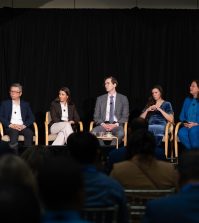Public sector in Cambodia to be linked digitally with other countries

Cambodia’s public sector is to be digitally linked with other countries in a new initiative launched by the UN Development Programme (UNDP).
The Cambodian programme is the latest of a number of UNDP Accelerator Labs schemes being rolled out in Africa, South America, Asia and Eastern Europe. The aim is to bring together grassroots ideas with technology and real-time data in order to meet complex global challenges such as climate change, youth unemployment and inequality.
Speaking at the launch last week, Nick Beresford, UNDP resident representative, said the new programme in Cambodia will focus on innovations in the public sector.
He said: “We think there’s lots of value within the civil servants themselves who often have great ideas and potential but they need a safe space to be able to experiment and bring these ideas to the service so that’s what we want to try to work with them on encouraging. This new creativity is from within government,” Cambodian newspaper, Khmer Times reported.
Beresford told the audience that technology has a big role to play in meeting the UN’s development goals. “We all need to be faster and more entrepreneurial if we are going to hit the sustainable development goals by 2030,” he said.
“Accelerator Labs in Cambodia and 59 other countries are a new approach to finding sustainable solutions to the current complex challenges in the development sector,” he said.
Global experiment
The network of worldwide labs was first launched by UNDP, Germany, and Qatar in New York during the summer of 2019 and described as a “global experiment” to accelerate progress towards achieving development goals. There are now more than 60 labs working with national and international partners across 78 countries.
Achim Steiner, UNDP administrator, said at the time: ”We are just at the beginning of this bold journey, but we are moving quickly. We have almost completed the set-up phase for 60 Accelerator Labs after screening 8,000 lab team applicants.
“We are already receiving great responses from government partners, tech hubs, and innovation labs around the world who are keen to work with UNDP’s accelerator labs on innovative solutions to challenges like urbanisation, marine plastics and creating employment opportunities for young people,” he added.
The Cambodian government is aiming to digitise all departments and become a digital economy by 2023 and it is hoped the UNDP initiative will help towards that goal.
Youk Bunna, secretary of state at the Cambodian Ministry of Civil Service said: “Accelerator Labs will improve public services and transform society as a whole through changing the officials’ perspective and mindset to provide better services to people.”
The government will train civil servants and public sector staff on the new initiative.























